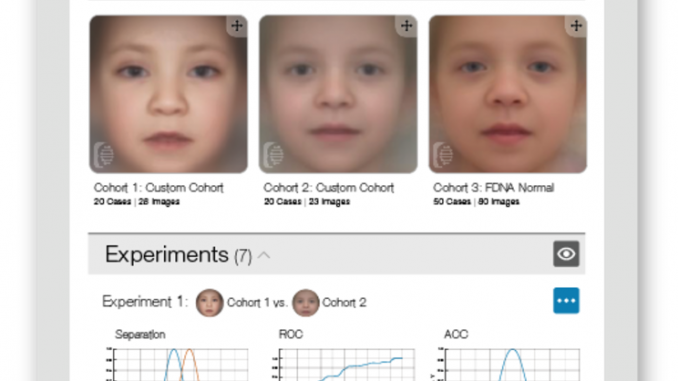
Boston startup FDNA, which makes a suite of apps called Face2Gene that use facial analysis, artificial intelligence and genomic insights in hopes of improving diagnoses and treatment of rare diseases, has launched a new tool for clinicians. Using de-identified data from their patients, clinicians can now share their findings and test and analyze patient cohorts with other clinicians around the world on Face2Gene’s Research application.
The new Research application builds on the Face2Gene app, which FDNA created out of a desire to create the world’s largest repository of rare disease big data. After snapping a smartphone photo of a patient the doctor suspects of, the app (which is only available to clinicians) analyzes the photo based on facial characteristics and compares the image against Face2Gene’s database, and within seconds, the clinician is offered a list of possible diseases along with the degree of probability for each one. While not a diagnostic tool, the Face2Gene app is intended to help clinicians as they go about testing for a specific condition.
The company – whose founders developed the facial recognition software purchased by Facebook – launched the Research application under their Year of Discovery initiative, wherein they hope to unite clinicians, labs and patients around the world to accelerate rare disease discoveries and understanding.
“When we started thinking about this, we made a very interesting discovery: it turns out rare diseases are not rare at all,” FDNA CEO and cofounder Dekel Gelbman told MobiHealthNews in an interview. “They make up a huge group of people around the world, and if you group them together, there are ways they can be evaluated.”
In the United States, about one out of 10 people (30 million total) are living with a rare disease, and 350 million people worldwide. On average, it takes about seven years from the time symptoms are present to get a diagnosis.
“Our mission is to save lives by reducing the diagnostic odyssey these patients go through,” said Gelbman. “The problem is the complexity of reaching a diagnosis, and so many physicians are unaware of the range of diseases because they are, by themselves, rare.”
But if there were a curated, aggregated database of all those different diseases, Gelbman said, they could then apply deep learning and artificial intelligence to bring the far-flung communities of people living with – and clinicians treating – rare diseases a little closer together. So FDNA spent the first three years of their existence as a company dedicated slowly to research, working with collaborators in clinical and academic settings to build up a trove of data.
To read the full article By Heather Mack on MobileHealthNews.com http://www.mobihealthnews.com/content/fdna-launches-app-based-tool-clinicians-using-facial-recognition-ai-and-genetic-big-data
